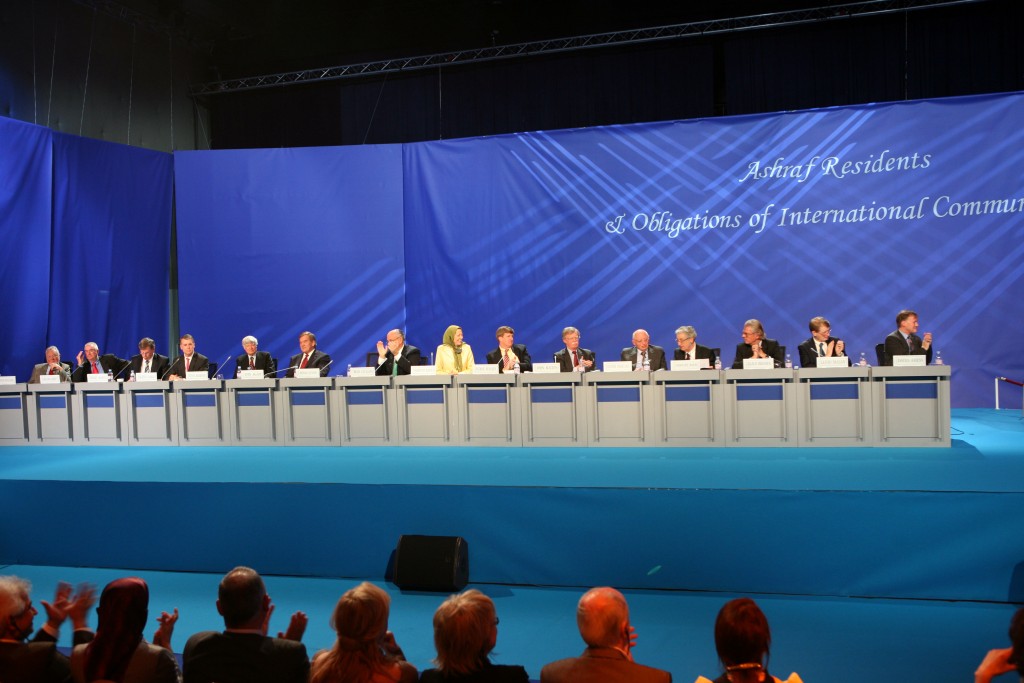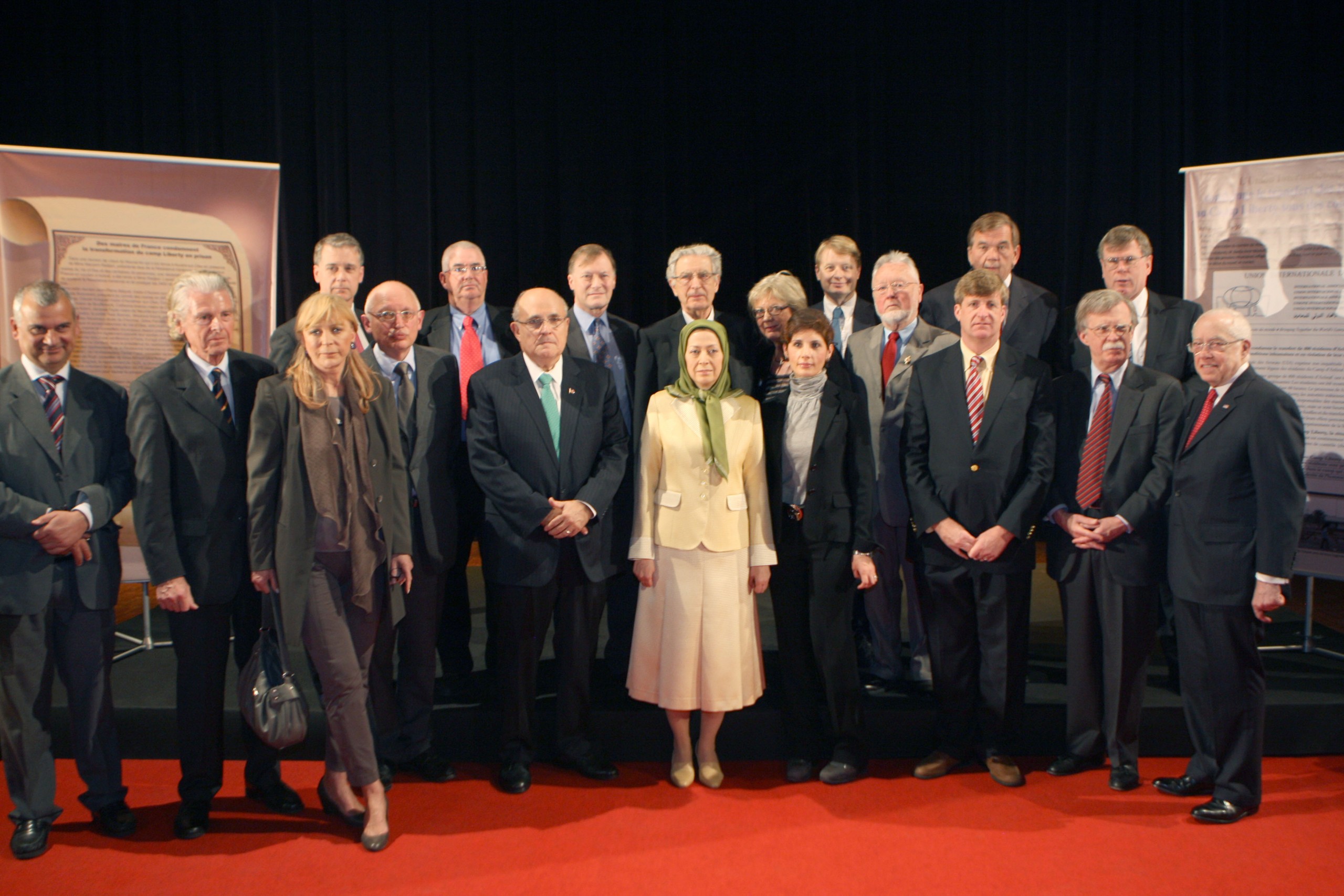Speech at the international conference in Paris

Dear Friends,
Good day to all of you.
I wish to extend my gratitude to the French Committee for a Democratic Iran, which has organized this event.
At the outset, I would like to express my condolences on the tragic events in France.
My deepest condolences to the people of France, to the Jewish community and especially to the families of the victims of these recent terrorist incidents.
This catastrophe is the modus operandi of fundamentalism under the banner of Islam, whose heart beats in Tehran and Qom.
Since a quarter century ago, we warned against the dangers posed by fundamentalism.
As a Muslim woman, I must emphasize that these atrocities have nothing to do with Islam.
In Chapter Table (Maaida), the holy Quran states, “If any one slew a person, it would be as if he slew the whole people: and if any one saved a life, it would be as if he saved the life of the whole people.”
Last month, in a public speech, the regime’s supreme leader Ali Khamenei said that his regime provides assistance to the Hezbollah in Lebanon. Is there any other signal more obvious than these remarks as to who the principal source of terrorism and fundamentalism is?
The Iranian regime presents its fundamentalism and terrorism under the cloak of religion. Therefore, in order to confront it, there is a need for a tolerant and democratic Islam.
And the People’s Mojahedin represent this democratic alternative, which is the antithesis to fundamentalism.
They represent an Islam, whose message is mercy, freedom, equality, fraternity, love and coexistence among all religions.
Allow me to continue in Farsi.
Dear Friends,
On the fifth day of Nowrouz and the start of spring, I again congratulate all of you, my compatriots inside and outside Iran on the occasion of the New Year.
With the warmest greetings and congratulations, I wish the brave women and men, who are struggling to overthrow the ruling religious theocracy and the blossoming of the spring of freedom and democracy in Iran, victory.
I hope that the New Year would be a year when the people on the whole of the region would be rid of the religious fascism ruling Iran.
I feel privileged to be meeting you, our dear friends from the United States and different European countries who have come here on this day.
The conference is being held on eve of the anniversary of deadly raid by Iraqi forces on the defenseless residents of Camp Ashraf on April 8. It was a crime against humanity based on the planning and orders of the regime’s supreme leader and in coordination with the terrorist Qods Force and designed to eliminate all the residents of Ashraf.
On that day, the attackers in their armored vehicles drove over at least 22 residents of Ashraf and murdered 36 of them. But the Ashrafis defeated Khamenei’s plan to destroy its main opposition.
The April 8, 2011 attack was in reality the most important response Khamenei gave to the Iranian people’s uprisings, which had two months earlier had shaken the regime to its foundation. As such, the attack demonstrated the Iranian regime’s urgent need to destroy the resistance movement. At the same time, it showed that the Iraqi government was doing the bidding of Tehran and the US government’s irresponsible policy towards the residents of Ashraf since it was a violation of the US commitment to each resident. It short, the US adopted a policy that pleased the mullahs in Tehran.
It is common knowledge that a few hours before the killings on April 8th, a US military unit at Ashraf suddenly left the Camp. The question that still remains since then is who issued the order for the US withdrawal? Where is the commander of that unit who could testify about the truth?
Indeed, why was there no investigation about this massacre as demanded by the UN High Commissioner for Human Rights?
And why were US Congressional delegations and European Parliamentarians, who were seeking to visit Ashraf and called for investigations into this raid, not allowed to visit?
In reality, the attack on Ashraf in essence is reflective of a major crisis, namely the Iranian problem.
The ruling theocracy has reached a dead end. On the one hand, inside the country, the regime is faced with a major schism at the highest echelons of ruling clique, the prospect of eruption of uprisings in Iranian cities loom and coupled with deep economic bankruptcy.
And on the other hand, outside Iran, the trend toward the fall of the Syrian dictatorship has made the mullahs irreparably vulnerable.
To escape this mortal reality, the mullahs have resorted to ever greater terrorism and warmongering. The unprecedented rise in executions, 670 in the past year, accelerating the efforts to obtain nuclear weapons and directly taking part in the killing of the people of Syria are part and parcel of this policy.
But at its very core of this policy is the effort to eliminate the organized resistance movement and to attack Ashraf, which hold the key to change in Iran.
Indeed, the mullahs, in order to escape their inevitable overthrow, have resorted to war against the people of Iran, the region and the international community.
To confront this evil warmongering which threatens regional and global security a decisive policy is in order. The West’s policies to deal with this regime, however, have all failed.
We see that in the face of the regime’s nuclear danger, the US government is on the one hand exaggerating the impact of international sanctions and on the other is promoting the baseless assessment that as though the mullahs have not yet made a decision t to build a nuclear bomb.
When a heavily armed forces has begun marching forward from a distance, who would benefit from saying that there is no movement forward?
Similarly, western governments have taken a passive attitude towards the Syrian regime’s crimes against humanity. Nevertheless, the mullahs, with the help of the Iraqi government, are repeatedly sending arms shipments to Bashar Assad’s regime.
And finally, the policies of the United States and the European Union is submitting to the mullahs’ covetous designs on Ashraf and the unjustified continuation of the Mojahedin’s terrorist designation have benefited the Iranian regime.
But, kowtowing to the religious fascism ruling Iran is the flip side of the bankruptcy of the policy of appeasement. The other side is harsh and venomous attacks on those who advocate change in Iran.

Today, everyone can see that a powerful tendency among senior politicians, officials and military commander in different US administrations in the past 20 years has taken shape and views the establishment of democracy in Iran as the effective solution to the Iranian problem.
Since years ago, the same tendency has enjoyed enormous credibility and important stature in the US House of Representatives and Senate.
Majorities in 30 national parliaments in Europe have also voiced support for these objectives in recent years.
Clearly then, the recent attacks by a few anonymous US officials against this dignitaries who promote democracy in Iran, is in truth prompted by the bankruptcy of the policy of appeasement and conciliation.
These attacks are of course unjust and unfair and quite unethical and immoral. But beyond that, when you open the curtains, you recognize that these policies are in a showdown against one other.
On the one side there is a policy which wants that the mullahs’ regime in power. As a result, in the face of the threats posed by religious fascism and its terrorism and efforts to get the bomb, the proponents of this policy attempt to hide their utter weakness through empty posturing and words. The proponents of this policy are so desperate that they might ultimately allow the ruling mullahs to obtain nuclear weapons.
On the other side, there is a tendency which wants to see the mullahs overthrown. This front is comprised of renowned US personalities who have embarked on an honest and responsible campaign to change an outdated policy. For this reason, those shortsighted appeasers are attacking them.
The Iranian people’s resistance is at the core of the showdown between these two policies.
These personalities who truly embody defense of democracy have repeatedly criticized the US government for reneging on its commitments to protect the residents of Camp Ashraf.
The question is: Do reneging on commitments, turning one’s back on ethical principles, ignoring international laws and adopting policies that serve the interests of the Iranian regime, benefit the real interests of the United States and the wider world, or the call for a change in those policies?
The main sin these honorable personalities have committed is that they are demanding an end to the mullahs’ nuclear program, calling for their overthrow and preventing a nuclear Iran, which would threaten international peace and security.
Their sin is that they have opposed following the Iranian regime’s plans and designs against Ashraf and its residents. Recall that in one of these conferences about the correct policy vis-à-vis Iran, Amb. John Bolton said unequivocally that Ashraf is part of the solution to the Iranian problem and not part of the problem itself.
These personalities have also spoken out loud and clear about the realities in Camp Liberty. They have asked why humanitarian and human rights standards non-existent at Camp Liberty are.
For this reason, anonymous US officials who are trying to cover up the situation at Camp Liberty are upset about remarks by these luminaries. They complain why Mayor Giuliani has spoken against building prisons in Camp Liberty. Is stating an obvious fact really a crime? Or hiding it?
Indeed, if the conditions of the Camp are acceptable, why did you not allow 21 of these luminaries, who said they were ready to visit Liberty, to actually go there?
The bigger sin these luminaries have committed is that they have protested against injustice and the flouting of law concerning the Iranian Resistance, namely the designation of the PMOI. They have stated the obvious fact that the PMOI’s continued designation lacks legitimacy and is legally and ethically unjustified.
Recall that Gen. Shelton went even beyond that and wrote the refusal to remove the PMOI’s designation was betraying democracy. And let me quote from Secretary Ridge, who said that if we want to see a democratic Iran, regime change is our only hope. And the potential for achieving democracy in Iran lies with an opposition group which is committed to democratic change, namely the People’s Mojahedin which has been subjected to genocide for decades.
In the mean time, the talking heads and the media controlled by the Iranian regime have joined the chorus to slander and insult these personalities. The regime’s notorious agents in the US fan the fuel of these attacks.
Do the opinion leaders in the US not feel ashamed for joining the religious fascism ruling Iran?
Nevertheless, the people and history will pass quick judgment that these personalities have offered the greatest service to global peace and security.
No wonder that lawmakers in the US, in the EU and in the United Kingdom have expressed outrage and abhorrence at this campaign of character assassination. As the adage goes, “if you don’t like the message, shoot the messenger.”
So, let me repeat the call by Judge Mukasey to
- Tags: Iran, Maryam Rajavi, Mojahedin

